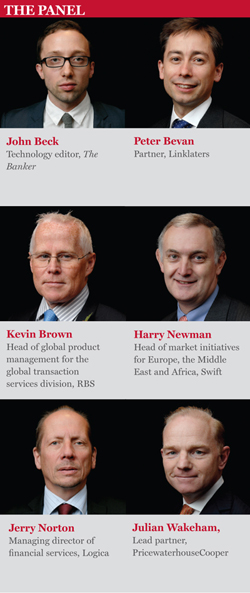Transaction banking’s increased prominence in the global financial landscape has been well documented, but its increased standing has created issues as well as openings for market participants. Its rise in popularity has led to more competition, while the impact of macro-economic conditions, higher customer expectations and an unprecedented regulatory burden has made it increasingly tough just to stay in business. At a recent round table hosted by The Banker, a panel of industry experts discussed the challenges and opportunities faced by today's transaction bankers. The event, part of an ongoing series, was sponsored by Royal Bank of Scotland, but independently written and edited.
The unassuming mix of cash management, payments, trade finance and securities and custody services, which comprise transaction banking operations, make for unlikely stars in the complex hierarchies of the financial world. But given the economic crisis, their rise in status should not have been surprising.
Editor's choice
By the tail end of 2008, the very qualities that meant transaction services were often overlooked in times of plenty – steady but less than spectacular returns and a relatively dependable customer base – suddenly seemed very attractive.
Business may be good, but as a panel of banking treasury and technology experts explained in a recent Leadership Series round table discussion hosted by The Banker, that does not mean the going is easy. The appeal of those all-important steady returns has amplified competition, and banks across the globe have ratcheted up transaction services businesses.
At the same time, the demands of even staying afloat are growing thanks to the macro-economic environment, increased technological needs, growing customer expectations and the compliance requirements of unparalleled amounts of regulation. Along with challenges, however, a changing business landscape presents opportunities for banks to differentiate themselves from the competition and attract new customers.
Watch the videoThis is an edited video of the discussion from The Banker's Exclusive Leadership Series. Click below to view more:
|
Practical optimism
Asked for his take on the current transaction banking landscape, Kevin Brown, head of global product management for the Royal Bank of Scotland’s (RBS) global transaction services division, described a mood of “practical optimism” in the industry at present, buoyed by its ever-relevant nature.
“Transaction banking provides the heartbeat of all of the businesses and the 35 countries in which RBS operates, providing trade financing, payments and cash management services, and the working capital to support our clients,” he said. “Even through the current market turmoil, those functions need to continue. Payments still need to be made, for example salaries, trade needs to continue as does the cycle of doing business. I think it is one of those businesses within banking which is critical to the economy.”
Transaction banking provides the heartbeat of all of the businesses and the 35 countries in which RBS operates, providing trade financing, payments and cash management services, and the working capital to support our clients
With investment banking revenues plummeting, transaction banking’s assured place in the economy has inevitably led to increased competition. Banks across the world are beefing up their transaction services segments, poaching staff and marketing aggressively in an attempt to wrest precious market share away from their peers. According to Mr Brown: “It has become a very attractive business. Our CEO [Stephen Hester] has often said that this is one of the most competitive businesses given its attractiveness.”
New entrants, different edge
It is not just large global banks vying for a piece of the pie, said Julian Wakeham, lead partner with PricewaterhouseCooper’s transaction banking practice. “The velocity and breadth of trade is allowing a number of banks to look at this as a business.
"We are seeing a lot of local banks, possibly with regional ambitions, starting to focus management teams on this for the first time. Banks that would have seen payments from cash management and even trade as a cost centre are beginning to really focus their management teams now… and that focus allows them to genuinely grow that business and the franchise.” Mr Wakeham went on to say that these include institutions across Africa, Canada, Asia and Australia, which are beginning to form or develop transaction banking businesses.
According to Mr Wakeham, these local banks will have some advantages over their larger peers. “They will have a competitive lead, because they have real empathy and engagement with their local customer base.” It is this kind of specialisation which all but the largest players will have to nurture in order to stay competitive, he added. “There are very few banks that can provide a total global solution. Most banks will have to focus very clearly and define exactly what franchise they are going to serve and understand how they differentiate that franchise.”
Further competition will come from outside the banking world. Recent years have seen a rise in prominence of non-bank technology and service providers. As yet, they have only gained significant traction in niche areas of the market, and it remains to be seen whether they will manage to take more market share from more established players, but they could well prove dangerous with the right business plan, warned Harry Newman, head of market initiatives for Europe, the Middle East and Africa with the Society for Worldwide Interbank Financial Telecommunication (Swift).
The more astute contenders will not try to take on banks at their own game, he suggested, saying: “If new entrants really try to be transaction banks… they will end up as transaction banks and in exactly the same situation, so it will be more or less a volume game. The smart ones, I suspect, will try to take the client relationship and get somebody else to do all of that nasty banking stuff that requires regulation and costs real money.”
Price pressure
Jerry Norton, managing director of financial services with business and technology service company Logica, warned that while the fundamentals of transaction business are very strong and volumes will continue to increase, competition will inevitably drive prices downward, making it even harder for any bank or business to stay profitable. “The issue is that as you get more competitors, then you are going to get more price pressure, and market participants will have to start looking at other ways to differentiate themselves in that market. I think that is one of the key issues that banks have to respond to.”
Additional demands are being heaped upon market participants by the increasingly global nature of transaction banking. Operating as a truly international player requires more scale than ever before as new trade flows and relationships open up, and regional balances of power shift. For Mr Newman, this has two distinct repercussions for transaction banks.
“The issues raised by globalisation and regional variations are somewhat schizophrenic. The industry is becoming more global and you see that in a number of ways. Trade flows are more global and the world is becoming more interconnected in shorter time frames, but at the same time, one of the products of the crisis is more regional variation,” he said. “We can no longer expect countries such as China and India to follow London and New York in terms of how they develop, because holding them up as this great example is not so credible anymore.”
This tension between greater standardisation and more regional variation could become an issue for banks looking to do business internationally and access large up and coming local markets, he added.
Fragmented legislation
Regulatory fragmentation is an additional barrier to international operations, said Mr Brown, due to the additional operational complexity it creates. “One of our continued frustrations is the lack of consistency when we see regulation applied, whether that's in a European context, or in a global context. And I suspect when you look forward at Basel III, you will see the same impact, as there are regional and national variations in terms of the approach. Of course, that then drives market opportunity and market differences in terms of the way you deliver in those environments.”
Peter Bevan, a partner with UK law firms Linklaters, who advises on financial regulation, added that even in Europe, where the market has become much more harmonised, there are still major issues for successful international operations. Further afield, these issues are amplified.
“One of the challenges is how you offer your client a global window on your business," he said. "How do you let them have one point of entry with you, which can access whatever you have got in terms of an international network with the relevant local regulatory capacity and capability? Do you have to partner with someone locally to access their licence, and if so, are you going to have to do business with your competitors? There are a number of different ways you can approach it, but they certainly bring their own challenges.”
One of the challenges is how you offer your client a global window on your business
In fact these issues may become so major that they also force a change in business model, said Mr Norton, who suggested that the need for in-depth customer knowledge and familiarity with local regulatory regimes coupled with the cost of doing business, will lead to more region-specific business models.
“You will start to see less global reach and range and more regionalisation depending upon local knowledge, and depending on your client relationships and how they want to do business,” he said. “I think there is a new model here which is not global reach and range, but partnering with another bank to handle the other bit of that customer relationship, in Asia-Pacific, for example, which cannot be done in Europe.”
A lack of regulatory harmonisation will certainly affect global banks that assembled business models in expectation of regulatory standardisation, agreed Mr Brown, and the impact will extend beyond the banking world, he said. “It is an issue for our clients as well, particularly the multinationals [that] had also started to anticipate those standards becoming more uniform [and invested as well].”
Regulatory drain
More generally, regulation is one of the biggest challenges facing the transaction banking industry. Certainly there has been no shortage of incoming legislative demands, from those with pre-crisis origins, such as the Payment Services Directive (PSD) or Single Euro Payments Area (SEPA) designed to promote regulatory harmonisation, to other, more sweeping changes, such as the US’s Dodd-Frank Act or the all encompassing Basel III, designed to avoid a repeat of 2008’s financial meltdown.
Transaction banking operations are, in most cases, not being specifically targeted, but the risk is that they become collateral damage, said Mr Bevan, and, he warned, the problem is only set to escalate. “The worry for transaction banking is that it is caught in the crossfire of [the] regulation of banks more generally.”
The sheer speed at which regulation is now being introduced is likely to invoke a spectre of unintended consequences, Mr Bevan added, and banks may not be in the best position to do anything about it. “The financial sector is in an unprecedentedly weak position to influence this regulation because its political stock is sadly very low. So these things [regulations] come out very quickly with a political agenda, and the banking world’s ability to shape them is limited,” he said.
For the banks themselves, just keeping pace with the mountains of compliance demands required to stay in business is no small task, admitted Mr Brown. “From a bank perspective, the effort involved in terms of systems changes and training of people is huge, and it has been a consistent roll of activity. We have had PSD and SEPA in Europe and Dodd-Frank in the US, for example, and all of those things have implications in terms of the way banks do business in terms of legal documentation, training, technology and delivery.”
Of course, significant changes will make significant demands on budget and resources. They will inevitably push up operational costs, and, Mr Wakeham said these increases in price will inevitably be passed on to end users. “Ultimately, the customer will have to pay, whether that's in the form of increased price of risk mitigation, through hedging of trade finance, or indirectly because retail banking may well cease to be free in the UK. I am not sure the impact on customer cost has really been thought through in all of this regulation.”
“I am sure it has not,” agreed Mr Newman, adding, however, that in lobbying regulatory bodies, banks have to pick their battles carefully, targeting inefficiencies and unintended consequences. “We need to be a bit careful that we do not sit around and say 'there is just too much regulation', partly because that is just the way it is, and partly because quite a lot of it is probably good. The issue really is the unnecessary cost put into the industry as a result of inconsistency and room for variation, which leads to people spending money two or three times when they could actually do it once.”
Transacting with technology
A good chunk of the cost of meeting regulatory demands is incurred by mandatory technology upgrades, noted Mr Norton. “Transaction banking has to become a real-time or near real-time activity because of customer needs, but also because of the fact that regulators want banks to monitor some of these risks in real time… That is not an easy alteration. It is not necessarily difficult technology, but to change the processes that go with that, that is quite a big change.”
He added that technology is also being leveraged to provide increased control for the banks themselves. “Banks need to have real-time control, they need to know what is going where and they need dashboards and all the rest, which traditionally was not really the focus. I think. Real time and control are the two big technology trends I see in transaction banking.
Mr Wakeman commented that the importance of consumer-facing technology is also growing, in part as a result of the high standard of customer experience set by online retailers and the like. “The mass markets' computing experience is defined at the retail level, and they are telling the institutions what they want to see. So there is a real shift in people saying 'this is how my service should be delivered to me'. And I think banks will need to embrace the new technologies, such as mobile technology, social media and the like." He cautions, however, that before any glossier technologies are deployed, the core capabilities must be in place. “You have got to be able to do the basics before you can start spending on some of this front-end technology.”
These goals chime with Mr Brown’s perception of transaction banking’s technology priorities. Fundamentals, he said, must come first. “First of all, the focus is around stability of your platforms in terms of being able to deliver. That is the heartbeat to both the bank, and to clients' business. If you talk to our clients, you will see that what they are looking to see is for this to happen day in, day out, with no issues whatsoever. It is their key buying criteria.”
Agreeing with Mr Wakeman’s earlier point, Mr Brown added that delivery is ever more important. “A lot the underlying products that we have, particularly in trade, but in payments as well, have been there for many years and have not changed fundamentally in many years. But what is changing, and what is changing rapidly, is the way we deliver those products and services to our clients.
"We are now dealing with individuals within the corporate client, and tailoring services to meet their needs. Their expectations are so much higher given their experience in the outside world in terms of technology.”
He went on to mention Electronic Bank Account Management (EBAM) – as a particularly hot IT topic at the current time, adding that another is 3SKey, Swift’s multi-network personal digital identity system for corporate and banking users.
Pros and cons
Indeed, new technology may be creating new opportunities, but it is undoubtedly also creating new risks, such as cyber crime and data loss, as Mr Norton pointed out. “The more that business goes electronic and the more it moves to real time, then paradoxically the more you need security,” he said.
Mr Newman suggested that the magnitude of new technology demands will inevitably mean that banks are unable to handle them all in house. “They won't be able to do all of it themselves. Whether it's leveraging Swift connectivity for corporates – which means multi-bank corporates can use a common platform – or making use of a mobile technology company to deliver payment access to your bank accounts, banks are not going to deliver it all on their technology anymore.”
This does, of course, lead to the risk that banks become disintermediated from their customer, with the all-important customer contact handled elsewhere so that a bank becomes a factory, rather than a 'shop'. The best way to guard against this, argued Mr Brown, was to prioritise customer interactions.
“It all comes back to the deepness of the relationship you have with your client, not just the transaction services, but also the debt support and credit that you are providing those clients in terms of activity. And I think those things together build a strong relationship with a client that allows you to continue to service and support and build with them,” he said.
This was a message that was repeated throughout the panel discussion. Times may be tough, and potential threats may be numerous in today’s transaction banking landscape, but handled correctly, these multifarious challenges provide financial institutions and other providers with the opportunity to gain new business by offering products and services that provide genuine and meaningful competitive differentiation.





